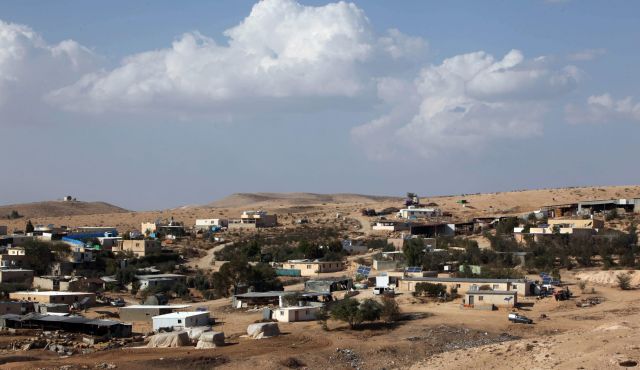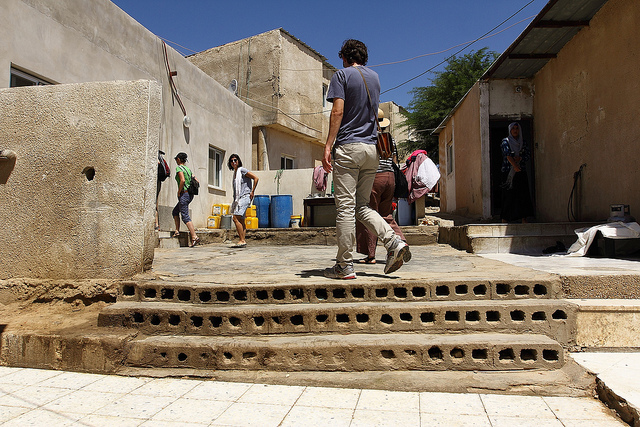Bedouin call on court to block destruction of their Negev village
 Wednesday, November 20, 2013 at 11:19PM
Wednesday, November 20, 2013 at 11:19PM http://www.haaretz.com/news/national/.premium-1.559077
"The court could avoid making a clear ruling' says attorney for Umm-al-Hiran villagers. "The bench is very mixed and anything can happen".
by Shirley Seidler 20 November 2103 Haaretz

Residents of the Negev Bedouin village Umm al-Hiran, whom the state intends to evict to make way for a new Jewish community on the land they’ve been living on since 1956, go before the Supreme Court today in a bid to block the state's plans.
The residents are appealing the decision by the Be’er Sheva District Court, which rejected their request to block the destruction of their village. The court ruled that the villagers were not squatters, as the state claimed, since they had received the land for Umm al-Hiran from the state in 1956. However, the court said the state has the right to evict them because it had given them the land without exacting payment. Previously, though, the villagers had wandered from place to place after being expelled from their tribal land by Israeli authorities.
The villagers’ attorney, Suhad Bishara of Adalah - the Legal Center for Arab Minority Rights in Israel, said it is difficult to predict the court's mood in today’s hearing. “The court might say it won’t interfere in a government decision, and thus the state can destroy the village. Or, they could understand the problematic nature of the eviction and try to find a solution,” she said.
The court could offer a compromise solution, but the families of Umm al-Hiran have said they will not accept one, having already turned down an offer to move to the nearby town of Hura. “The court could avoid making a clear ruling; the bench is very mixed and anything could happen,” Bishara said. The justices hearing the case are Elyakim Rubinstein, Daphne Barak-Erez and Neal Hendel.
Two protest rallies were held Wednesday morning in Jerusalem. Residents of Umm al-Hiran plan to demonstrate with members of an Arab-Jewish grassroots movement, Tarabut-Hithabrut, and Rabbis for Human Rights during the Knesset Interior Committee meeting on the controversial Prawer plan for relocating Negev Bedouin. Another demonstration is planned outside the Supreme Court building during the Umm al-Hiran hearing, and protesters plan to be in the courtroom for the proceedings.
Ofer Dagan of the Negev Coexistence Forum said: “The Supreme Court is the last obstacle before implementation of the racist plan that will lead to the eviction of an entire village." Last week the cabinet voted to speed up demolition of the village's homes so work on the new Jewish community can start within 60 days.
-------------------------------------------------------------------------------------------------------------------------------
A Special problem: How Israel is transplanting the Bedouin of al-Hiran
"It's important for us that Israeli citizens understand the magintude of the injustice" says resident of Umm al-Hiran, who faces eviction in the face of new construction for a Jewish town.
by Shirley Seidler 16 November 2013 Haaretz
 The village of Umm al-Hiran in the Negev
The village of Umm al-Hiran in the Negev
Last week saw another round in the dispute between the Garin, settling community, slated to move to Hiran and the Bedouin residents of Umm al-Hiran. The former have lived in the midst of the pastoral green forest for the past three years, eagerly awaiting their final resettlement. The latter have lived in endless sand dunes among acacia trees since the 1950s. Now both groups await a Supreme Court decision that will rule whether the Bedouins may continue living on the land they received from the government or be transplanted from the site in order to serve the ideology of others.
Since 2008, the Hiran Garin has been seeking to settle in the Negev and held contacts with the Ministry for Development of the Negev and the Galilee. “The common denominator among all the settling communities is a search for meaningful Zionist action,” says Shmuel Bezek, one of the garin. The garin grew by word of mouth and through the distribution of pamphlets in synagogues, common practice in groups of this type. Still, the government told the group that no land was found to allocate to them.
But it turns out that already in 2001 the Ministry of National Infrastructure, at the time headed by Avigdor Leiberman, and later by Efi Eitam of the Mafdal, presented a document outlining land allocated to a settlement named Hiran. The report was submitted to Uzi Keren, who served for nine years as the Prime Minister’s settlement advisor and chairman of the Inter-Ministry Committee for New Settlements in the Prime Minister’s office. Keren worked under Ariel Sharon and Ehud Olmert, and during Eitam's tenure as housing minister.
According to the document, the planning permit was issued in 1997, outlining 2,500 dunams of land, where some 2,000 housing units could be built. Towards the end of the document detailing the town, under the header “special problems,” three clauses were listed: the first dealt with environmental damage to the desert, but the document drafters claimed that the JNF approved of the plan. The second problem was the slowing down of planning due to the demands of the National Council of Planning and Building to examine the development of the whole Yatir region. The third clause consisted of the words: “There are Bedouins on the land.”

Salim Abu Alkian of Umm al-Hiran laughs when he is told of this clause. “That’s how it is,” he says, “for the state we’re a problem.” When his clan heard that a town was to be built in place of their village, they submitted an objection to the regional planning council. The council did not accept the objection but deferred the decision to the National Council of Planning and Building.
In 2012, the National Council approved the outline plan for Hiran, the latest in a series of decisions by the state. Despite being approved, work on the town was delayed following an appeal by Bedouin residents. “One of the reasons for submitting objections was to gain time,” one of the residents admits. “It’s important for us that Israeli citizens understand the magnitude of the injustice. We’re not invaders or criminals, What the state is doing to us is illegal.”
The fact that no bulldozers were seen in the area doesn’t seem to calm the fears of Umm al-Hiran residents. Ever since 2002, when the National Council approved the construction of Hiran, they face endless suits and evacuation orders, which are often carried out despite court injunctions in their favor.
In 2007, several construction sites in the village were demolished despite the residents presenting court injunctions in their defense. “I was always told I was naïve,” Abu Alkian said. “But at the demonstration this week I understood who we’re dealing with.” He was referring to the demonstration that took place in the entrance to Sde Boker, on a commemorative morning when the cabinet held a special session at the kibbutz honoring 40 years since the death of David Ben Gurion. The Bedouin activists weren’t allowed to enter the kibbutz, and several of them were violently arrested by police.
“The state says there aren’t enough places to settle in the Negev,” Abu Alkian says. “But it’s all down to government decisions. One can decide that a certain place is fit for Jewish settlement, and one can recognize existing Bedouin villages. The state adopts the most racist decision possible.”
-------------------------------------------------------------------------------------------------------------------------------
 APJP |
APJP |  Post a Comment |
Post a Comment |
Reader Comments